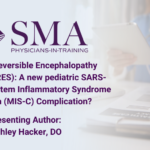Abstract | May 4, 2021
Posterior Reversible Encephalopathy Syndrome (PRES): A new pediatric SARS-CoV-2 Multisystem Inflammatory Syndrome in Children (MIS-C) Complication?
Learning Objectives
- Upon the completion of this lecture, learners should be better prepared to identify a potential new life- threatening sequelae of Covid-19 infection in a pediatric patient.
Posterior reversible encephalopathy syndrome (PRES) has symptoms of headache, altered mental status, visual changes, and seizures with radiographic evidence of edema in the posterior cerebral hemispheres that is typically benign with complete symptomatic resolution in days-weeks. The etiology is thought to be a combination of endothelial dysfunction and hypertension caused by autoregulatory failure. PRES has been documented to occur in patients with hypertension, renal disease and immunosuppression. Recently several case studies have shown association with COVID-19 in adults. This case demonstrates a previously undescribed association between PRES and a child with SARS CoV-2 Multisystem Inflammatory Syndrome in Children (MIS-C).
A previously healthy 12-year-old female, who was diagnosed and treated for mild-moderate MIS-C five days prior, re-presented with worsening headache and weakness. In the emergency department she had two generalized tonic-clonic seizures lasting approximately 90 seconds. She did not return to baseline after second seizure and was noted to have elevated blood pressure readings. She was admitted to the Pediatric Intensive Care Unit where she remained hypertensive with blood pressures as high as 165/110 (>99th percentile for age, gender and height). MRI of the brain showed multifocal areas of abnormalities in the cerebral and cerebellar hemispheres consistent with PRES. She had continued seizure activity and alteration in her level of consciousness requiring intubation, and blood pressure control with nicardipine. Over the next five days, as the blood pressure stabilized, patient’s seizure activity abated, and she returned to neurologic baseline.
The correlation between COVID-19 and MIS-C has been well demonstrated and is thought to be caused by immune dysregulation. Neurologic symptoms such as altered mental status, cerebellar abnormalities, and seizures have been documented in children with MIS-C. One study shows SARS-CoV-2 attaches to angiotensin-converting- enzyme 2 (ACE2) receptors that are present on neurons and glial cells which can potentially lead to cerebral edema. Studies showing PRES in adult patients with COVID-19 hypothesize that SARS-CoV-2 attachment to ACE2 receptors in the brain may cause endothelial dysfunction leading to PRES. It is unclear if SARS-CoV-2 MIS-C directly caused PRES in our patient, though the correlation should be further examined and pediatric providers should be aware of this association.

